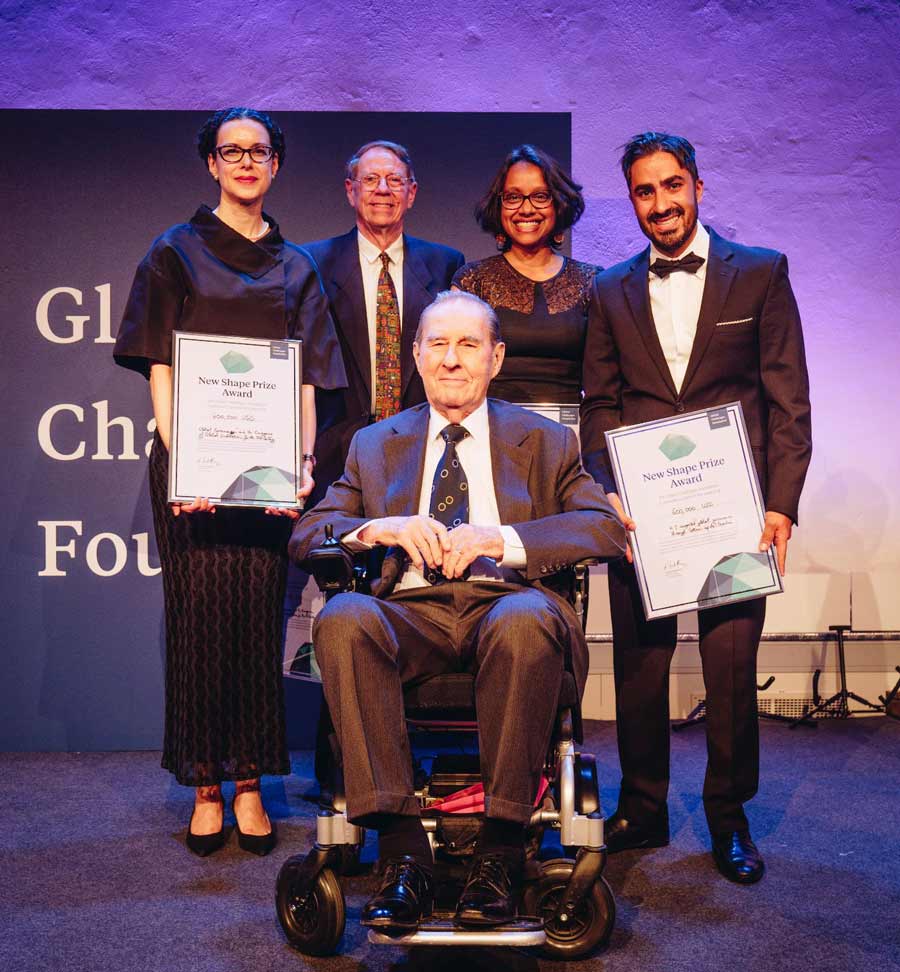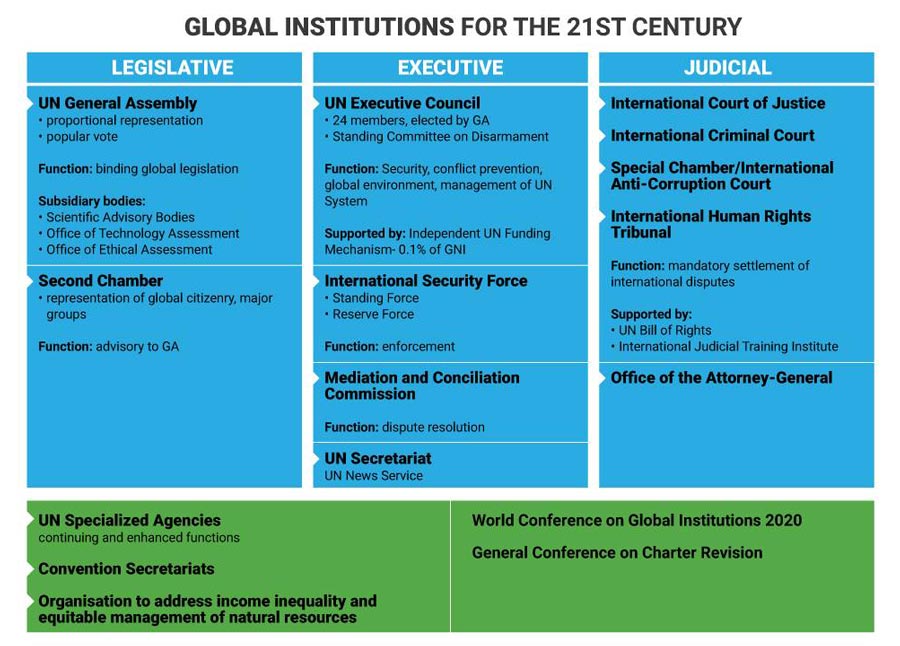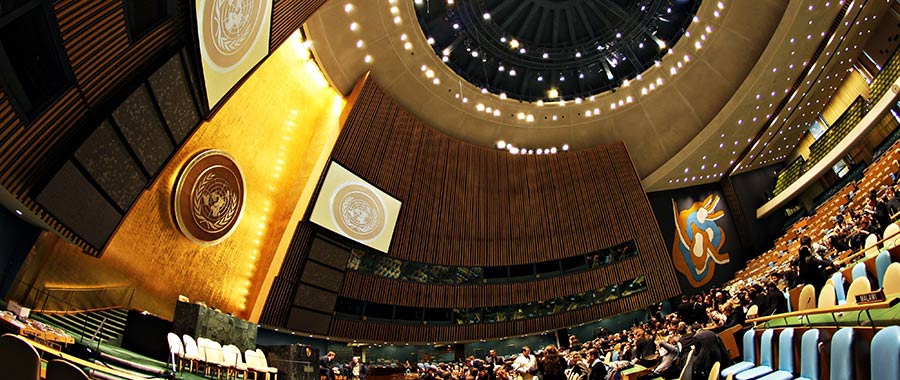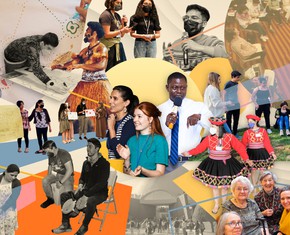As the world grows more interconnected and as the imperative to unite humanity becomes ever more strongly felt, systems of global governance need to evolve.

Maja Groff (left), Arthur Dahl, and two other winners of the New Shape Prize award stand with Laszlo Szombatfalvy (front), the founder and chairman of the Global Challenges Foundation. (Photo by Global Challenges Foundation)
This idea is at the core of an award-winning proposal to reshape global governance, put forward by three Baha’is who specialize in aspects of governance in international affairs.
“Many of the problems we face are global in nature. They cannot be solved without some kind of stronger mechanism of international cooperation,” says Augusto Lopez-Claros, an international economist and co-author of the proposal.
The United Nations provides a foundation for global governance, but the proposal makes a case for a stronger international governing body. The proposal outlines a mechanism with two legislative bodies: one with national representatives and the second with delegates who represent particular global issues, such as the environment, human rights, and others. It would also include a strengthened executive branch with an international security force, as well as a well-trained international judiciary that regularly makes binding decisions.
The proposal was one of three winners of the New Shape Prize in May from the Global Challenges Foundation, a non-profit organization that aims to stimulate discussions on systems for managing global risks.
Dr. Lopez-Claros, former Director of Global Indicators Group at the World Bank Group and currently a senior fellow at the School of Foreign Service at Georgetown University, collaborated with Maja Groff, an international lawyer based in The Hague, Netherlands, and Arthur Dahl, a former senior official with the U. N. Environment Programme and current President of the International Environment Forum, on the proposal to reform the U.N. and other global institutions. Titled “Global Governance and the Emergence of Global Institutions for the 21st Century,” the proposal highlights the need for a system of global governance capable of effectively addressing the major contemporary challenges facing humanity.

This graphic, created by the proposal’s authors, gives an overview of the system of global governance that Arthur Dahl, Maja Groff, and Augusto Lopez-Claros put forth.
“The principles and various aspects of our proposal draw upon the wisdom of multiple generations and thinkers from a variety of backgrounds,” says Ms. Groff, who works with the Hague Conference on Private International Law. “We hope to engage with the common aspirations of humanity.”
Dr. Dahl noted that the past decades have exposed the limitations of the U.N. system to solve issues that cross national boundaries, a challenge that requires new thinking about the U.N., its further evolution, and its mandate. “A range of inherently global crises cannot be solved outside the framework of global collective action involving supranational cooperation and a fundamental rethinking of the meaning of ‘national interest,’” the paper describes.
… as to religious, racial, national and political bias: all these prejudices strike at the very root of human life; one and all they beget bloodshed, and the ruination of the world. So long as these prejudices survive, there will be continuous and fearsome wars.
To remedy this condition there must be universal peace. To bring this about, a Supreme Tribunal must be established, representative of all governments and peoples; questions both national and international must be referred thereto, and all must carry out the decrees of this Tribunal. Should any government or people disobey, let the whole world arise against that government or people. – Abdu’l-Baha, Selections from the Writings of Abdu’l-Baha, p. 248.
… the Supreme Tribunal which Baha’u’llah has described will fulfil this sacred task with the utmost might and power. And His plan is this: that the national assemblies of each country and nation—that is to say parliaments—should elect two or three persons who are the choicest men of that nation, and are well informed concerning international laws and the relations between governments and aware of the essential needs of the world of humanity in this day. The number of these representatives should be in proportion to the number of inhabitants of that country. The election of these souls who are chosen by the national assembly, that is, the parliament, must be confirmed by the upper house, the congress and the cabinet and also by the president or monarch so these persons may be the elected ones of all the nation and the government. From among these people the members of the Supreme Tribunal will be elected, and all mankind will thus have a share therein, for every one of these delegates is fully representative of his nation. When the Supreme Tribunal gives a ruling on any international question, either unanimously or by majority rule, there will no longer be any pretext for the plaintiff or ground of objection for the defendant. In case any of the governments or nations, in the execution of the irrefutable decision of the Supreme Tribunal, be negligent or dilatory, the rest of the nations will rise up against it, because all the governments and nations of the world are the supporters of this Supreme Tribunal. Consider what a firm foundation this is! – Ibid., pp. 306-307.
For the three authors, this means it is necessary to build upon structures that exist in the U.N.
“Taken together, our proposals would ensure that the U.N. moves as soon as possible to a model of coherent governance, analogous to what we expect from effective national government systems with capacities for ongoing monitoring and rapid response to current and emerging global risks,” Ms. Groff explained.
















Comments
Sign in or create an account
Continue with Googleor